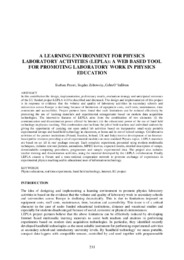| dc.contributor.author | Pecori, Barbara | en |
| dc.contributor.author | Zoltowsky, Bogdan | en |
| dc.contributor.author | O’Sullivan, Colm | en |
| dc.coverage.spatial | CY - Λευκωσία | en |
| dc.creator | Pecori, Barbara | en |
| dc.creator | Zoltowsky, Bogdan | en |
| dc.creator | O’Sullivan, Colm | en |
| dc.date.accessioned | 2016-02-09T07:01:39Z | |
| dc.date.available | 2016-02-09T07:01:39Z | |
| dc.date.issued | 2005 | |
| dc.identifier.uri | http://hdl.handle.net/10797/14614 | en |
| dc.description | Περιέχει το πλήρες κείμενο | el |
| dc.description.abstract | In this contribution the design, implementation, preliminary results, evaluation strategy and anticipated outcomes of the EU funded project LEPLA will be described and discussed. The design and implementation of this project is in response to evidence that the volume and quality of laboratory activities in secondary schools and universities across Europe is declining because of limitations of equipment costs, staff costs, maintenance, time constraints and accessibility. Project partners have found that such limitations can be reduced effectively by promoting the use of learning materials and experimental arrangements based on modern data acquisition technologies. The innovative features of LEPLA arise from the combination of two elements: (i) the communication and dissemination power offered by Internet; (ii) the educational power of the use of hand held technology in physics teaching. This combination can facilitate the job of both teachers and individual students by giving the opportunity of carrying out open ended lab activities based on inexpensive small-scale portable experimental set-ups and hand held technology in classroom, at home and in out-of-school settings. Collaborative activities of the partner institutions (Poland, Sweden, Ireland, UK and Italy) involve development of an Internet-based public resource providing a set of experimental modules on most standard Physics topics. LEPLA materials are based on an 'all in one' package concept. Each complete experiment, presented using modern multimedia techniques, includes relevant pictures, animations, MPEG movies, expected results, detailed description of setups, downloadable computing procedures, programmes and sample experimental data. The project also includes teacher training and dissemination activities, using the material developed by the LEPLA collaboration. Finally LEPLA creates a Forum and a trans-national cooperation network to promote exchange of experiences in experimental physics teaching and in educational uses of information technology. | en |
| dc.language.iso | eng | en |
| dc.publisher | University of Zilina | en |
| dc.relation.ispartof | Information and communication technology | en |
| dc.rights | info:eu-repo/semantics/openAccess | en |
| dc.rights | Open Access | en |
| dc.source | CBLIS Conference Proceedings 2005 Integrating New Technologies in Science and Education | en |
| dc.title | A learning environment for physics laboratory activities (lepla): a web based tool for promoting laboratory work in physics education | en |
| dc.type | info:eu-repo/semantics/conferenceObject | en |
| dc.subject.uncontrolledterm | Physics education | en |
| dc.subject.uncontrolledterm | Real time experiments | en |
| dc.subject.uncontrolledterm | Hand held technology | en |
| dc.subject.uncontrolledterm | Internet | en |
| dc.subject.uncontrolledterm | EU project | en |
| dc.contributor.conferenceorganizer | Learning in Science Group, University of Cyprus | en |
| dc.contributor.coordinator | Constantinou, Constantinos P. | en |
